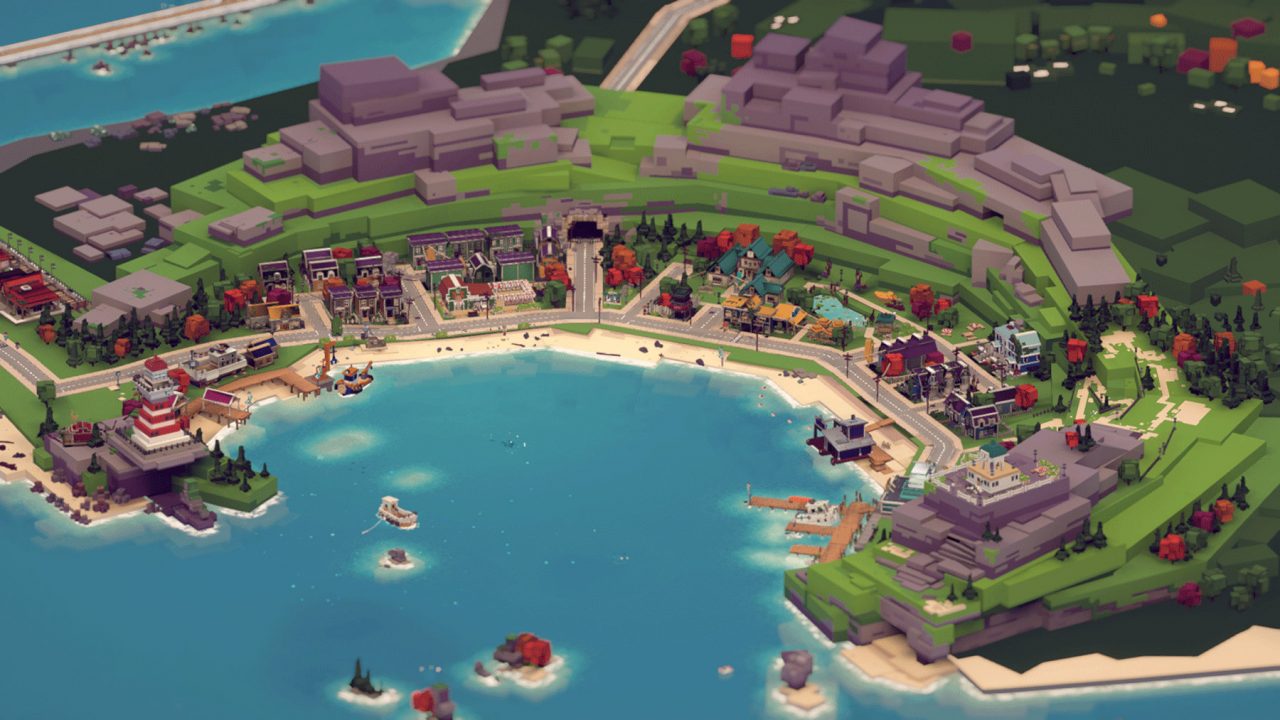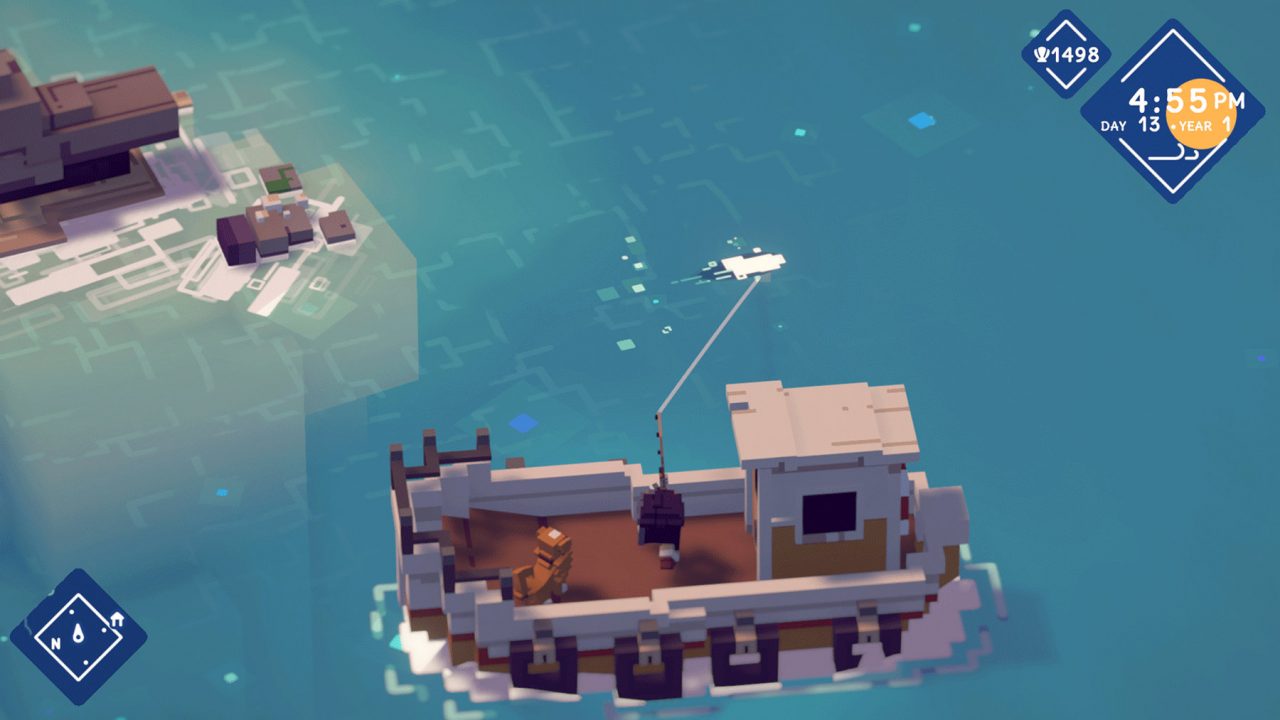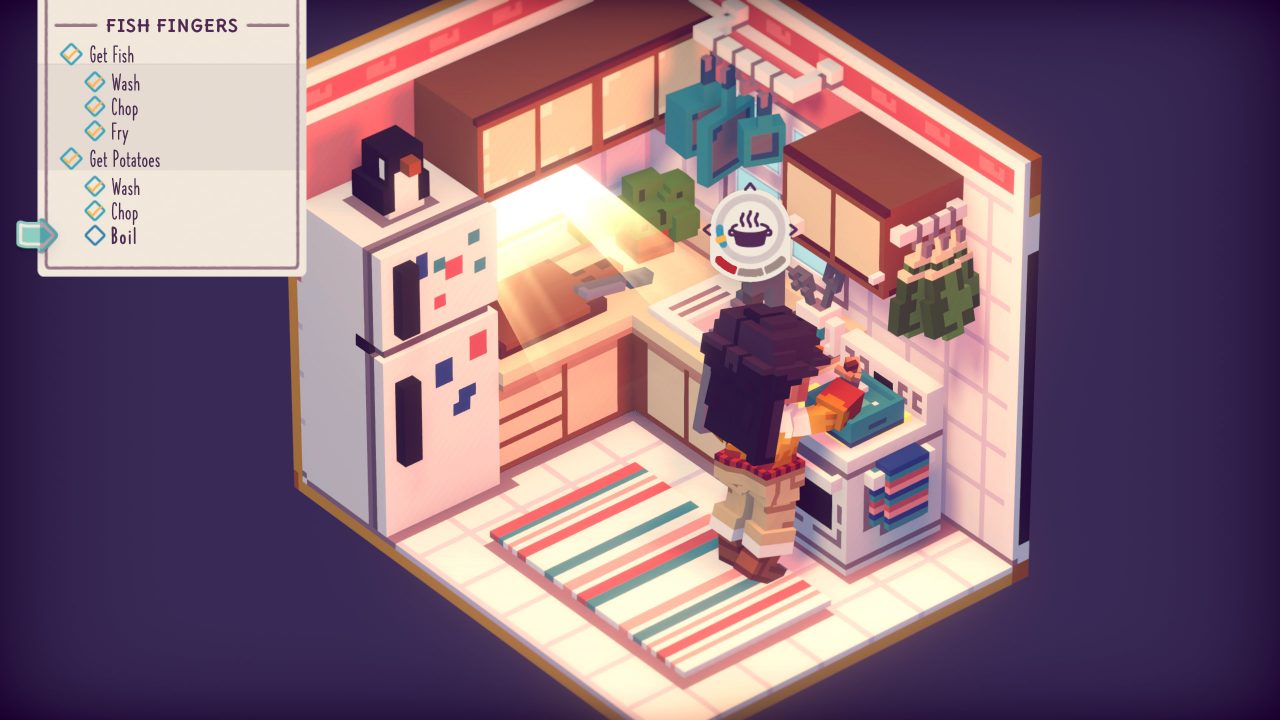You’d be forgiven if you immediately thought of Stardew Valley upon first seeing Moonglow Bay. The relaxed atmosphere, focus on rebuilding your local community, and overall aesthetics of the game make it difficult not to draw comparisons to Eric Barone’s 2016 smash hit. But the similarities are only superficial in nature, and Moonglow Bay manages to spin its own take on the genre for better and for worse.
Starting with the good, Moonglow Bay’s aesthetics and attention to detail are absolutely top-notch. The voxel artwork is complemented nicely with hand-drawn portraits of the characters and individual species of fish. The overall diversity demonstrated in the environments is also impressive. Although some things, like the geysers, suffer from janky animations, going the extra mile to add such details definitely pays off in making exploration a memorable experience.
The pleasant OST also deserves a special mention. I especially enjoyed how the tone and timbre of the main theme changes dynamically depending on which buildings you enter in town. One highlight is the electronic, funky vibes of the tech store, and I’d often stay well after I was done with my shopping just to keep listening.

As one might glean from the name, Moonglow Bay’s primary gameplay loop revolves around fishing. A fan-favorite activity in many an RPG, Moonglow Bay seems to add all the right details to fully flesh it out into a compelling core gameplay loop. Four fishing rods, three lure types, and two bait types are available for experimentation. Additionally, an extensive catalog of fish, shellfish, and everything in between across a variety of biomes promises hours upon hours of gameplay as you try to collect them all.
Once you actually begin fishing, however, the experience proves to not quite live up to its potential. For one, “striking” the fish, where you essentially give your fishing rod a hard yank to pull your line closer, makes catching even the feistiest of fish a fairly trivial matter. Seeing as how casting line range seems to have little to no effect on the types of fish you catch, throwing out your line just a little ways away from your trawler and striking once or twice to close out the deal ends up being a disappointingly easy method even late into the game.
The lackluster rod fishing is only exacerbated by the fact that net-fishing and lobster traps are simply more effective alternatives for the objectives you’re tasked with completing throughout the course of the game. When paying thousands of shells, the in-game currency, is the norm for various upgrades and property renovations for meaningful progression, simply casting out a net to catch a handful of fish at once to cook and sell in batches later naturally becomes the more appealing option. While this means you do end up missing out on the larger species of fish, dishes cooked with medium-sized fish and various shellfish and crustaceans sell for more than enough to complete the more expensive objectives without too much difficulty.

Fishing efficiently becomes especially important as you unlock more and more town renovation options, with prices for each refurbishment rising dramatically. But despite all the effort I poured into getting the community up and running again, I never really felt much of a connection since many of the changes felt superficial at best. The buildings get a nice new look and the beaches are tidied up, but more often than not I was just running down a checklist of what to fix next. Passive increases in the selling price of your goods are about the most tangible upgrades you can expect for most renovations, with even considerably expensive jobs like the library feeling hollow as the payout is just a tiny room not even the size of your kitchen.
Thankfully, cooking is an unequivocally enjoyable experience, and the minigames’ utilization within the various recipes is where the real heart of the game lies. Cooking is comprised of several minigames of actions one might take in the kitchen, from simply grabbing ingredients out of the fridge to giving the finishing sears to a dish. Zoning out whilst cooking a batch of fish poutine was a borderline therapeutic experience after some long real-life days, and more than covered whatever disappointment I had with the fishing itself.
Boss fights also deserve a special mention for their mostly sound implementation. Moonglow Bay is the last game I imagined would have boss fights earmarking the end of story chapters, but the manner in which they both neatly tie up the main conflict of the chapter and provide interesting gameplay is commendable. My only complaint would be that the game doesn’t really communicate to the player what it wants them to do in order to complete the boss fights, which led to some frustrating moments of just pressing every action in hopes of lucking into the correct way to play the fight.

But whatever enjoyment I was able to glean from the above didn’t last long due to the glaring lack of polish of the main game itself. I’d often miss out on requests posted by the townspeople on the community bulletin board due to them disappearing into the void of their homes and offices, subsequently becoming impossible to interact with. Some quests seem to have clearly been designed with just one completion order in mind and become jarring continuity breaks with even the slightest of detours. Getting stuck between rocks and trees if you venture off the pavement is such a common occurrence there’s an option in the pause menu to just teleport you to the nearest safe spot. Bugs seem to increase exponentially as you progress through the game as progress bars and even cutscenes begin to glitch, making for a rough experience towards the end. It’s disappointing to see these issues lingering around despite several months to patch things up, and given the current pace of updates, I expect it will be a while till these bugs are gone for good.
Further adding to the messy experience is a borderline incomprehensible set of default PC controls. “Confirm” flip-flops between enter and the spacebar whilst too many flavors of WASD dictate navigation around the world and in various menus without any real rhyme or reason. Minigames also asking players to press between C, N, M, and V when all of them could just be mapped to a single interact key remains a baffling design decision. Even with extensive remapping, some minigames remain almost impossible to do properly due to the binary nature of PC controls. In the end, after struggling to even reach the options menu to rebind my keys at first, plugging in a controller proved to be the only way I could begin to even play the game.
Despite developer Bunnyhug getting so much right in terms of the presentation and some of the gameplay, the multitude of bugs and questionable design choices cast a heavy shadow that is impossible to ignore. Since its October release, there have been two patches to address some of the bugs, but the game still remains a messy experience overall. If you can look past the technical issues currently plaguing the game then Moonglow Bay could be a worthwhile time-sink, but it otherwise remains a difficult sell for all but the most diehard Harvest Moon fans.


